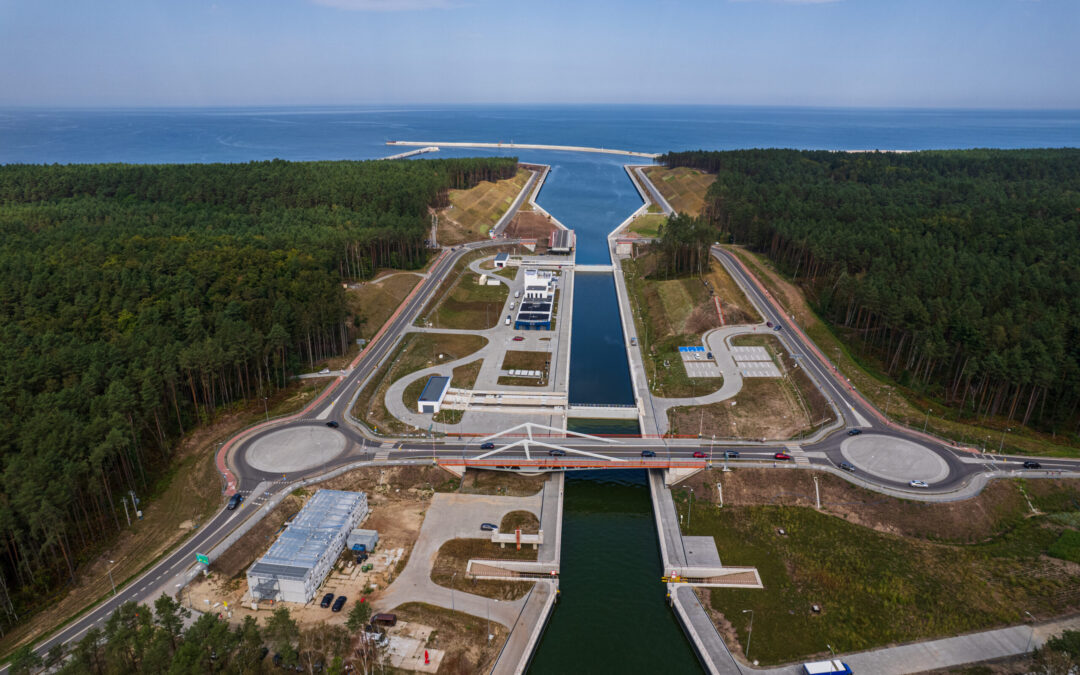One of the government’s flagship infrastructure projects – a canal allowing ships to avoid Russian waters, which opened last year – was economically unjustified and involved unlawful spending, the state audit office has found. It called the canal an “uneconomical path to nowhere”.
The Supreme Audit Office (NIK) pointed to the soaring costs of the project – which ended up costing more than double what was originally planned – and the fact that necessary work to make a nearby port accessible to ships using the canal has still not been carried out.
Nieopłacalna droga donikąd, miliony wydane niezasadnie – przekop przez Mierzeję był od zarania skazany na porażkę i nie mógł zwiększyć bezpieczeństwa w regionie. Minister odpowiedzialny wiedział, ale nie powiedział. NIK rozważa powiadomienie prokuratury.https://t.co/EzxQlWnmNi pic.twitter.com/czIvvl01F1
— Najwyższa Izba Kontroli (NIK) (@NIKgovPL) November 9, 2023
The 1,300-metre-long canal cuts across the Vistula Spit, thereby linking the Baltic Sea with the Vistula Lagoon. That allows ships to pass between without having to go through the waters of Russia’s Kaliningrad exclave.
It was opened last year on 17 September, the anniversary of the Soviet invasion of Poland in 1939, in a ceremony attended by President Andrzej Duda and Prime Minister Mateusz Morawiecki.
Duda declared the canal to be “a great victory for Poland, for patriots, for those who understand the word sovereignty”. He called it a “symbolical path” that will mean Poland no longer “has to ask for the consent of a country that is not friendly towards us, whose authorities do not hesitate to attack and enslave others”.
Poland has officially opened the new Vistula Spit canal, which will allow ships to bypass Russian waters.
Today, "on the anniversary of the Soviet attack on Poland [in 1939], we are breaking the last symbolic ties of dependence", says the prime minister https://t.co/2zBqtixwjo
— Notes from Poland 🇵🇱 (@notesfrompoland) September 17, 2022
However, in its report, published yesterday, NIK wrote that “the goal of state security cannot constitute a justification for conduct contrary to applicable law”.
Its audit found that the final cost of the project was almost 2 billion zloty (€450 million) compared to an initial estimate of 880 million. NIK calculated that 381 million zloty of that spending involved irregularities, with 213 million zloty spent in violation of the law.
The auditor noted that, even before construction began in 2019, the government acknowledged that the planned cost of the project could double, while even a 20% increase would make the plans economically unviable.
The government misspent billions on its pandemic response, including spending more on maintaining empty Covid beds than on treating patients, says the state audit office.
It wants prosecutors to bring charges against the state assets minister https://t.co/xPpAmEsesn
— Notes from Poland 🇵🇱 (@notesfrompoland) September 12, 2023
Among the problems identified by NIK were improper supervision of the programme by government agencies, which resulted in irregular spending. As an example, it cited the conclusion of 13 contracts, the costs and deadlines of which exceeded the framework outlined by the government in the plan.
Moreover, even though the canal was inaugurated over a year ago, work has still not been completed on dredging a channel from the canal to the port of Elbląg, meaning that larger vessels are still unable to enter the city’s port.
Among NIK’s findings was that a contract was concluded for the purchase of a dredger that was never actually used, resulting in wasted expenditure of almost 117 million zloty.
In response to NIK’s findings, the infrastructure ministry issued a statement to Business Insider Polska saying that “assessment of the cost-effectiveness of an investment is not limited to the economic dimension alone and the overriding role of the public interest must also be taken into account”.
“The increase in the programme’s value is due to the need to implement elements of the investment and the use of technologies that were not envisaged at the concept stage in 2016,” it added.
Meanwhile, the minister responsible for maritime affairs, Marek Gróbarczyk, claimed that NIK’s report was “political” and part of a “vendetta” against the government by the office’s president, Marian Banaś.
Banaś was once a member of the current govenrment but since taking over at NIK has become one of its biggest opponents. Gróbarczyk pointed to a secret recording of Banaś published last month that suggested he was preparing a series of reports that would embarrass the government.
A secret recording has been published by Polish state TV purporting to show the head of the state audit office discussing a plan to use his position to help the opposition ahead of this Sunday's elections https://t.co/dPUdHgCXUF
— Notes from Poland 🇵🇱 (@notesfrompoland) October 13, 2023

Notes from Poland is run by a small editorial team and published by an independent, non-profit foundation that is funded through donations from our readers. We cannot do what we do without your support.
Main image credit: IMGDY (under (CC BY-NC-ND 3.0 PL)

Alicja Ptak is deputy editor-in-chief of Notes from Poland and a multimedia journalist. She has written for Clean Energy Wire and The Times, and she hosts her own podcast, The Warsaw Wire, on Poland’s economy and energy sector. She previously worked for Reuters.



















